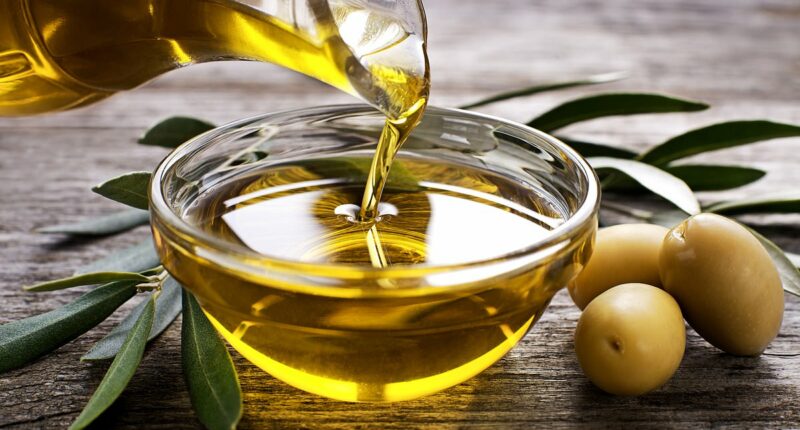Share this @internewscast.com
Oil has become a contentious topic in Britain’s culinary landscape, sparking heated debates among home cooks and chefs alike. This essential ingredient, whether used for sautéing, deep-frying, or simply drizzling over a fresh salad, presents a bewildering array of choices and considerations.
The dilemma lies in distinguishing which oils are truly beneficial for health. Some are celebrated as superfoods, lauded for their potential to enhance heart health and cognitive function. On the flip side, others are criticized for contributing to bodily inflammation and cardiovascular issues.
Adding to the complexity, certain oils can turn rancid if stored too long, while others are unsuitable for specific cooking methods. When exposed to high heat, some oils undergo chemical changes that could pose health risks.
In light of these concerns, a growing number of health-conscious individuals are moving away from traditional options like sunflower and rapeseed oils in favor of trendy alternatives such as coconut oil.
However, this raises an important question: Are these fashionable oils genuinely healthier, and how do they measure up against enduring staples like olive oil or butter?
But are these fashionable choices really any better for you – and how do they compare with kitchen classics like olive oil or butter?
Now experts have weighed in, revealing which oils you should be using – and which to avoid.
According to nutritionist Rob Hobson, author of Unprocess Your Family Life, one oil often criticised for its fat content isn’t nearly as bad as you might think.

While some oils promise the health conscious endless benefits such as boosting heart and brain health, others increase the your risk of heart disease
Extra Virgin Olive Oil
Mr Hobson says that his go-to is extra virgin olive oil for its health benefits and versatility of flavours.
‘It’s rich in monounsaturated fats and antioxidants, which are great for heart health, and it is less likely to break down when heated,’ he said.
This means it generally tolerates heat better and doesn’t break down until it gets very hot — with a smoke point of around 190 degrees, high enough for most cooking methods like sautéing.
The hotter the oil gets, the more chemicals are produced, especially at the ‘smoke point’ — the moment at which it starts to burn and smoke.
Such chemicals are called free radicals and can damage cells and cause them to age faster.
Research has shown exposure to high levels of free radicals may also raise the risk of conditions including heart disease.
It also contains low levels of saturated fat compared to other oils, around 2g per drizzle.
According to Mr Hobson, extra virgin olive oil is also high in polyphenols — a chemical compound found in plants – helping to support everything from blood vessel health to brain function.
While it can be used for high-heat cooking, its flavor and beneficial compounds diminish when overheated.
But to reap the full health benefits of extra virgin olive oil, which are generally much more expensive, they’re best used unheated.
‘Extra virgin oils are best left as finishing oils to maintain their flavour and aroma,’ Tracy Parker, senior dietitian at the British Heart Foundation also says.

Coconut oil is high in saturated fats with 12.99g per serving — almost half the recommended portion of 30g of saturated fat per day
Coconut Oil
Coconut oil is often touted as a healthier option — but experts are undecided.
It’s high in saturated fats with around 13g per 15ml serving — almost half the recommended portion of 30g of saturated fat per day.
Rhiannon Lambert, Harley Street nutritionist and author of The Science of Nutrition, says: ‘Approximately 90 per cent of its fat is saturated, which is a higher proportion than in butter.
‘Diets high in saturated fat can increase blood cholesterol levels which can raise the risk of heart disease.’
It’s supposed benefits are said to be due to the fact it contains lauric acid, a saturated fat, which some studies suggest may not be as harmful as other saturated fats.
Some research has suggested lauric acid raises HDL or ‘good’ cholesterol levels, which may lower overall heart disease risk.
But Mr Hobson stresses that the ‘jury is still out on coconut oil’s cardiovascular impacts’.
He adds: ‘It can raise your total cholesterol level, which is bad news for heart health. So it’s best used sparingly. Also you don’t always want everything to taste if coconut.’
‘While it’s great in stir fries, baking and curries, it’s not something I would fry my eggs in.’

Rapeseed oil stands out because it contains alpha-linolenic acid (ALA) which is an omega-3 fatty acid, a type of fat found in fish and essential for heart and brain health
Rapeseed and Flaxseed
One contender to olive oil, however, is rapeseed oil.
At £3.50 it is half the price and is also high in healthy monounsaturated fats, potentially reducing cardiovascular risk.
It’s also lower than olive oil in saturated fat with 1.1g per serving.
This particular oil stands out, Mr Hobson says, because it contains alpha-linolenic acid (ALA) which is an omega-3 fatty acid, a type of fat found in fish and essential for heart and brain health.
‘Omega-3s are often lacking in our diets, so incorporating oils like this can help to improve overall fatty acid intake,’ he said.
Flaxseed oil, which contains 1.65g of saturated fat, also has similar benefits to rapeseed oil.
Both contain omega-3 and omega-6 — but rapeseed oil has a more favourable omega-3 to omega-6 ratio than most other seed oils.
Omega-6 fatty acids are a type of fat that are essential for human health and are found in plant oils, nuts, and seeds, but some people argue too much may contribute to inflammation.
But Mr Hobson suggests these negative claims are ‘overblown’ and argues rapeseed oil can be a healthy addition to a balanced diet.
‘Rapeseed oil sometimes gets a bad rap because of its association with omega-6 and the perception that it’s a ‘processed’ oil,’ he says.
‘I think a lot of this criticism is overblown and fuelled by social media.’
One 2019 study published in the journal Circulation, found no association between moderate omega-6 intake and increased cardiovascular disease.
However, seed oils including flaxseed have lower smoke points, meaning they break down at a lower temperature and are more likely to release free radicals.
For this reason Hobson suggests just using flaxseed oil for dressings or drizzling.

It’s not just about the level of healthy fats if you are using these oils to cook with rather than drizzle on salads, you might want to consider their smoke points — the point at which the oil breaks down
Sunflower Oil
In recent years, seed oils have become the target of countless social media posts, with people claiming that they are ‘toxic’, ‘poisonous’ and, ultimately, are damaging our health.
Critics have nicknamed some seed oils the ‘hateful eight’ — canola, corn, cottonseed, grapeseed, soy, rice bran, sunflower and safflower — and blame them for causing heart disease and type 2 diabetes.
Sunflower oil, in particular, has a bad reputation due to its particularly high levels of omega-6 fatty acids.
If this fatty acid is consumed in excess without sufficient omega-3, it can contribute to an imbalance that promotes inflammation.
But there is no need to throw out your sunflower oil just yet, according to Mr Hobson, as it’s perfectly healthy to use in moderation.
It is also lower in saturated fat than olive oil and coconut oil at around 1.5g per serving.
And sunflower oil has a much higher smoke point at 232 degrees, making it great for frying, he says.












